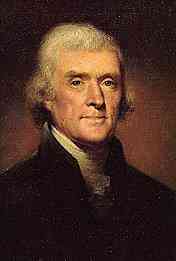To Sir John Sinclair Washington, June 30, 1803
 DEAR SIR,
DEAR SIR,-- It is so long since I have had the pleasure of writing to you, that it would be vain to look back to dates to connect the old and the new. Yet I ought not to pass over my acknowledgments to you for various publications received from time to time, and with great satisfaction and thankfulness. I send you a small one in return, the work of a very unlettered farmer, yet valuable, as it relates plain facts of importance to farmers. You will discover that Mr. Binns is an enthusiast for the use of gypsum. But there are two facts which prove he has a right to be so: 1. He began poor, andhas made himself tolerably rich by his farming alone. 2. The county of Loudon, in which he lives, had been so exhausted and wasted by bad husbandry, that it began to depopulate, the inhabitants going Southwardly in quest of better lands. Binns' success has stopped that emigration. It is now becoming one of the most productive counties of the State of Virginia, and the price given for the lands is multiplied manifold.
We are still uninformed here whether you are again at war. Bonaparte has produced such a state of things in Europe as it would seem difficult for him to relinquish in any sensible degree, and equally dangerous for Great Britain to suffer to go on, especially if accompanied by maritime preparations on his part. The events which have taken place in France have lessened in the American mind the motives of interest which it felt in that revolution, and its amity towards that country now rests on its love of peace and commerce. We see, at the same time, with great concern, the position in which Great Britain is placed, and should be sincerely afflicted were any disaster to deprive mankind of the benefit of such a bulwark against the torrent which has for some time been bearing down all before it. But her power and powers at sea seem to render everything safe in the end. Peace is our passion, and the wrongs might drive us from it. We prefer trying ever other just principles, right and safety, before we would recur to war.
I hope your agricultural institution goes on with success. I consider you as the author of all the good it shall do. A better idea has never been carried into practice. Our agricultural society has at length formed itself. Like our American Philosophical Society, it is voluntary, and unconnected with the public, and is precisely an execution of the plan I formerly sketched to you. Some State societies have been formed heretofore; the others will do the same . Each State society names two of its members of Congress to be their members in the Central society, which is of course together during the sessions of Congress. They are to select matter from the proceedings of the State societies, and to publish it; so that their publications may be called l'esprit des societes d'agriculture, &c. The Central society was formed the last winter only, so that it will be some time before they get under way. Mr. Madison, the Secretary of State, was elected their President.
Recollecting with great satisfaction our friendly intercourse
while I was in Europe, I nourish the
hope it still preserves a place
in your mind; and with my salutations, I pray you to accept
assurances of my constant attachment and high respect.
